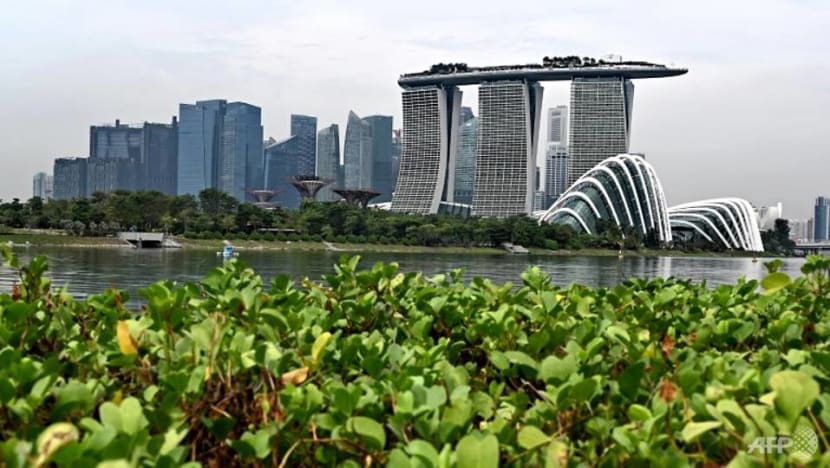Firms will have time to adapt to carbon tax changes, authorities to provide financial support: Gan Kim Yong

A view of the Singapore skyline. (Photo: AFP/Roslan RAHMAN)
SINGAPORE: Adjustments in Singapore’s carbon tax should be calibrated and made carefully so as to allow businesses enough time to adapt and stay competitive, said Trade and Industry Minister Gan Kim Yong in Parliament on Wednesday (Jan 12).
Setting the correct carbon price will guide investment decisions and spur companies to decarbonise, but it can also bring about higher costs for businesses and consumers, he noted.
“We should calibrate and pace the adjustment carefully to give companies sufficient time to adapt, put in place decarbonisation measures and stay competitive,” said Mr Gan.
Authorities will complement the carbon tax with financial support for businesses, he said, citing the S$180 million Enterprise Sustainability Programme which was rolled out last October.
The Government will also consider how to help ease cost increases, especially for lower-income households, as a higher carbon tax will have an “indirect impact” on households, the minister said.
For instance, when the carbon tax was first introduced in 2019, the Government provided additional U-Save utility rebates for three years, he noted. A programme that provides eligible households with vouchers to offset the cost of energy-efficient appliances was also subsequently introduced.
Mr Gan was responding to a motion on climate change moved by Members of Parliament (MPs) from the People’s Action Party, calling for the Government to enhance green financing, create more green jobs, among others.
In a wide-ranging debate that lasted more than five hours, a central focus was on increasing carbon taxes, seen as a critical tool in Singapore’s transition to a greener future.
The country’s existing carbon tax, which will be in place until 2023, is currently pegged at S$5 per tonne of emissions. Finance Minister Lawrence Wong has said that a revised carbon tax rate for 2024 will be announced in this year’s Budget.
RAISING CARBON TAX RATES
MPs who spoke during the debate, such as Mr Louis Ng (PAP-Nee Soon), agreed that the current carbon tax was too low.
Mr Ng said the tax rate, which is “the most powerful tool” to slash emissions, will have to be raised “significantly”. Its scope can also be expanded, he said.
At the moment, Singapore's carbon tax applies to all facilities that produce greenhouse gas emissions of 25,000 tonnes or more a year. This covers around 50 large emitters that contribute to 80 per cent of Singapore’s total carbon emissions.
“We should be aiming for a higher coverage,” said Mr Ng, adding that smaller emitters with at least 2,000 tonnes of emissions are already considered as “reportable facilities” and are paying the costs of monitoring and measuring their emissions.
“Given that any additional compliance costs would likely be minimal, it makes sense for the carbon tax to cover all reportable facilities,” he added. “Emitters, small and large, have a role to play.”
Mr Saktiandi Supaat (PAP-Bishan-Toa Payoh) also suggested establishing a fixed formula for the carbon tax rate to evolve over a longer period, which would help firms project their potential expenses and plan accordingly.
Though some experts have suggested aiming for a carbon price of US$50 to US$75 per tonne of carbon dioxide by 2030, he stressed the pace of increase must be carefully decided.
He suggested first setting the carbon tax level at least around US$8 to US$9 per tonne of emissions “or only slightly higher to inject some urgency for emitters to accelerate their decarbonising plans”. This price floor is where the voluntary market is valuing and trading carbon credits, he said.
SUPPORTING BUSINESSES IN TRANSITION
MP Liang Eng Hwa (PAP-Bukit Panjang) noted that businesses will face transition costs such as higher capital outlays and compliance costs, against a backdrop of supply-chain disruptions and slower global growth.
It is thus pivotal to help businesses “overcome the initial steep challenges” in this transition, he said. For instance, the tax increase should be progressively rolled out with a clear timeline.
It should also come with support from the Government, he said, citing measures such as increased funding support to help industries improve energy efficiency.
Related:
In addition, ample time for adjustments should be given to businesses, said MPs Foo Mee Har (PAP-West Coast) and Mariam Jaafar (PAP-Sembawang).
Ms Foo cited Sweden as an example, which she said took three decades of phased implementations before reaching its current carbon pricing “without haemorrhaging economic developments”.
“A clear long-term trajectory of the expected changes to carbon tax will be key to help companies make the business case to adopt new green technologies and make the necessary investment,” she added.
Mr Ng and Ms Foo also suggested that additional tax revenue collected from the increase in carbon taxes be channelled back to those affected, as subsidies to cope with higher costs during the transition period, or as incentives for companies to adopt green technologies.
BALANCING COVERAGE WITH POTENTIAL COMPLIANCE COSTS
Describing the carbon tax as “central” to Singapore’s climate mitigation strategy, Minister for Sustainability and the Environment Grace Fu also agreed that “a stronger price signal” is needed over time to make companies take bolder steps towards decarbonisation.
But she reiterated the need to balance the coverage of the tax with potential administrative costs for businesses.
The existing carbon tax threshold ensures the tax is applied at “key nodes” and flows through to the rest of the economy, she said. “This reduces the administrative load on small emitters, especially (small and medium-sized enterprises) to measure, report and verify their emissions.”
But she agreed on the need to support companies on their decarbonisation journey using revenue from the carbon tax.
“In fact, for the first five years, we are prepared to spend more than we collect, to incentivise the adoption of energy-efficient processes and other worthwhile abatement projects,” she said, adding that some revenue will also be used to help households.
Ms Fu added that additional funds have also been channelled towards research and development for low-carbon technologies and urban solutions.


















